
In folklore, a ghost is the soul or spirit of a dead person or non-human animal that is believed by some people to be able to appear to the living. In ghostlore, descriptions of ghosts vary widely, from an invisible presence to translucent or barely visible wispy shapes to realistic, lifelike forms. The deliberate attempt to contact the spirit of a deceased person is known as necromancy, or in spiritism as a séance. Other terms associated with it are apparition, haunt, haint, phantom, poltergeist, shade, specter, spirit, spook, wraith, demon, and ghoul.

Karen Louise Erdrich is a Native American author of novels, poetry, and children's books featuring Native American characters and settings. She is an enrolled member of the Turtle Mountain Band of Chippewa Indians of North Dakota, a federally recognized tribe of Ojibwe people.

Leslie Marmon Silko is an American writer. A woman of Laguna Pueblo descent, she is one of the key figures in the First Wave of what literary critic Kenneth Lincoln has called the Native American Renaissance.

Three Day Road is the first novel from Canadian writer Joseph Boyden. Joseph's maternal grandfather, as well as an uncle on his father's side, served as soldiers during the First World War, and Boyden draws upon a wealth of family narratives. This novel follows the journey of two young Cree men, Xavier and Elijah, who volunteer for that war and become snipers during the conflict. The book was generally critically well received.

Love Medicine is Louise Erdrich's debut novel, first published in 1984. Erdrich revised and expanded the novel in subsequent 1993 and 2009 editions. The book follows the lives of five interconnected Ojibwe families living on fictional reservations in Minnesota and North Dakota. The collection of short stories in the book spans six decades from the 1930s to the 1980s. Love Medicine garnered critical praise and won numerous awards, including the 1984 National Book Critics Circle Award.

Tracks is a novel by Louise Erdrich, published in 1988. It is the third in a tetralogy of novels beginning with Love Medicine that explores the interrelated lives of four Anishinaabe families living on an Indian reservation near the fictional town of Argus, North Dakota. Within the saga, Tracks is earliest chronologically, providing the back-story of several characters such as Lulu Lamartine and Marie Kashpaw who become prominent in the other novels. As in many of her other novels, Erdrich employs the use of multiple first-person narratives to relate the events of the plot, alternating between Nanapush, a tribal patriarch, and Pauline, a young girl of mixed heritage.
Native American literature is literature, both oral and written, produced by Native Americans in what is now the United States, from pre-Columbian times through to today. Famous authors include N. Scott Momaday, Leslie Marmon Silko, Simon Ortiz, Louise Erdrich, Gerald Vizenor, Joy Harjo, Sherman Alexie, D'Arcy McNickle, James Welch, Charles Eastman, Mourning Dove, Zitkala-Sa, John Rollin Ridge, Lynn Riggs, Hanay Geiogamah, William Apess, Samson Occom, and Stephen Graham Jones. Importantly, it is not "a" literature, but a set of literatures, since every tribe has its own cultural traditions. Since the 1960s, it has also become a significant field of literary studies, with academic journals, departments, and conferences devoted to the subject.

Heid E. Erdrich is a poet, editor, and writer. Erdrich is Ojibwe enrolled at Turtle Mountain.
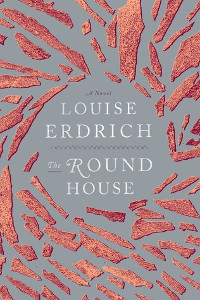
The Round House is a novel by the American writer Louise Erdrich first published on October 2, 2012 by HarperCollins. The Round House is Erdrich's 14th novel and is part of her "justice trilogy" of novels, which includes The Plague of Doves released in 2008 and LaRose in 2016. The Round House follows the story of Joe Coutts, a 13-year-old boy who is frustrated with the poor investigation into his mother's gruesome attack and sets out to find his mother's attacker with the help of his best friends, Cappy, Angus, and Zack. Like most of Erdrich's other works, The Round House is set on an Ojibwe reservation in North Dakota.

The Birchbark House is a 1999 indigenous juvenile realistic fiction novel by Louise Erdrich, and is the first book in a five book series known as The Birchbark series. The story follows the life of Omakayas and her Ojibwe community beginning in 1847 near present-day Lake Superior. The Birchbark House has received positive reviews and was a 1999 National Book Award Finalist for young people's fiction.
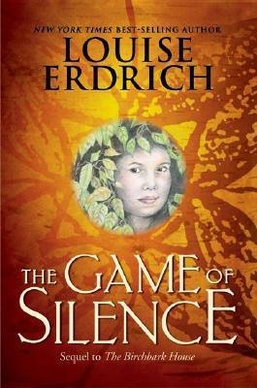
The Game of Silence is a 2005 novel by Louise Erdrich. It is the second novel in "The Birchbark" series that began with The Birchbark House. The two novels both feature the family of the Ojibwe girl Omakayas.

Original Local: Indigenous Foods, Stories and Recipes from the Upper Midwest is a recipe/collage book written by Heid E. Erdrich, published by the MN Historical Society Press in Minneapolis, Minnesota. Heid E. Sherman is a member of the North Dakota Turtle Mountain Band of the Ojibwe people who is currently based in South Minneapolis. Her cookbook explores native american cuisine and indigenous ingredients, within a globally-aware framework that includes stories, recollections and anecdotes.

Ghostlore is an intricate web of traditional beliefs and folklore surrounding ghosts and hauntings. Ghostlore has ingrained itself in the cultural fabric of societies worldwide. Defined by narratives often featuring apparitions of the deceased, ghostlore stands as a universal phenomenon, with roots extending deeply into human history.
List of works by or about American author Louise Erdrich.
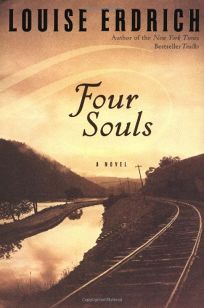
Four Souls (2004) is an entry in the Love Medicine series by Chippewa (Ojibwe) author Louise Erdrich. It was written after The Master Butcher’s Singing Club (2003) and before The Painted Drum (2005); however, the events of Four Souls take place after Tracks (1988). Four Souls follows Fleur Pillager, an Ojibwe woman, in her quest for revenge against the white man who stole her ancestral land. Fleur appears in many books in the series, and this novel takes place directly after her departure from the Little No Horse reservation at the end of Tracks. The novel is narrated by three characters, Nanapush, Polly Elizabeth, and Margaret, with Nanapush narrating all of the odd numbered chapters and Polly Elizabeth taking all but the last two even numbered chapters.
The Last Report on the Miracles at Little No Horse, first published in 2001, is a novel by author Louise Erdrich. The novel tells the story of Agnes DeWitt as Father Damien, the reverend who becomes part of the reservation community. Erdrich's narration alternates between Agnes’ early 20th-century memories and a series of interviews set in 1996 wherein another priest questions Damien about the possible canonization of Pauline Puyat.
The Night Watchman is a novel by Louise Erdrich first published on March 3, 2020, by HarperCollins. The novel is set in the 1950s. This is Erdrich's sixth standalone novel following Future Home of the Living God. The novel was inspired by the life of Erdrich's grandfather who motivated and inspired other members of the Turtle Mountain Reservation to resist the Indian termination policies of the 1940s-1960s. The Night Watchman is the first novel that Erdrich has written that is set on the Turtle Mountain Reservation.

Future Home of the Living God is a dystopian novel and work of speculative fiction by Louise Erdrich first published on November 14, 2017, by HarperCollins. The novel follows 26-year-old Cedar Hawk Songmaker, an Ojibwe woman raised by white parents, who visits her birth mother's reservation just as the United States becomes increasingly totalitarian following a reversal of evolution.

Chickadee is a 2012 historical fiction novel by American author Louise Erdrich, the fourth book in The Birchbark House series. Moving the story fourteen years into the future, the novel follows Omakaya's twin sons, Chickadee and Makoons, as the family moves further into the Great Plains. When Chickadee is kidnapped, he embarks on a journey to reunite with his family against a backdrop of American westward expansion.
Birchbark Books, also known by its full name, Birchbark Books & Native Arts, is an independent bookstore in Minneapolis, Minnesota in the Kenwood neighborhood. Selling both books and works of art, it was founded by Pulitzer Prize–winning Native American novelist Louise Erdrich in 2001.
















